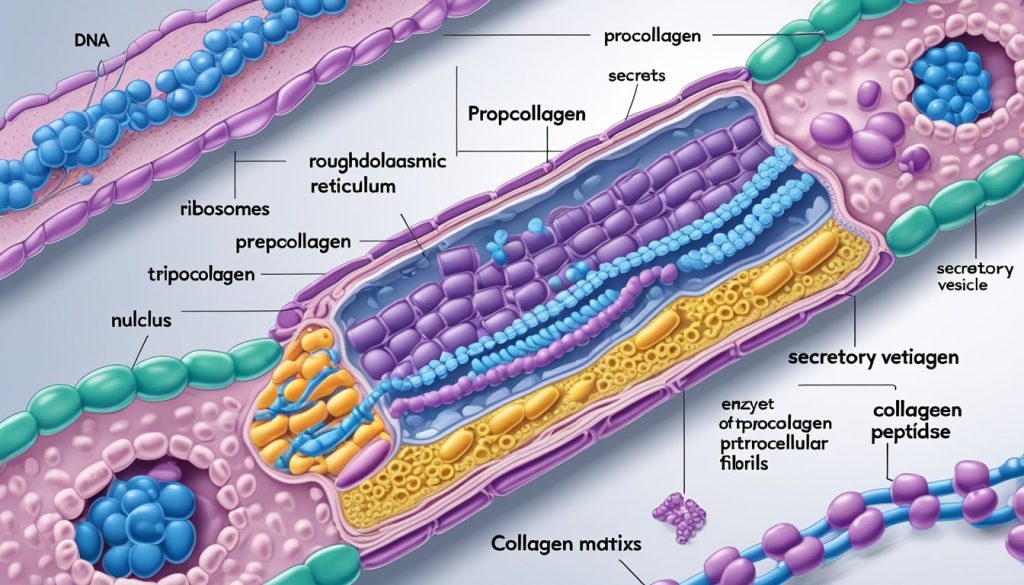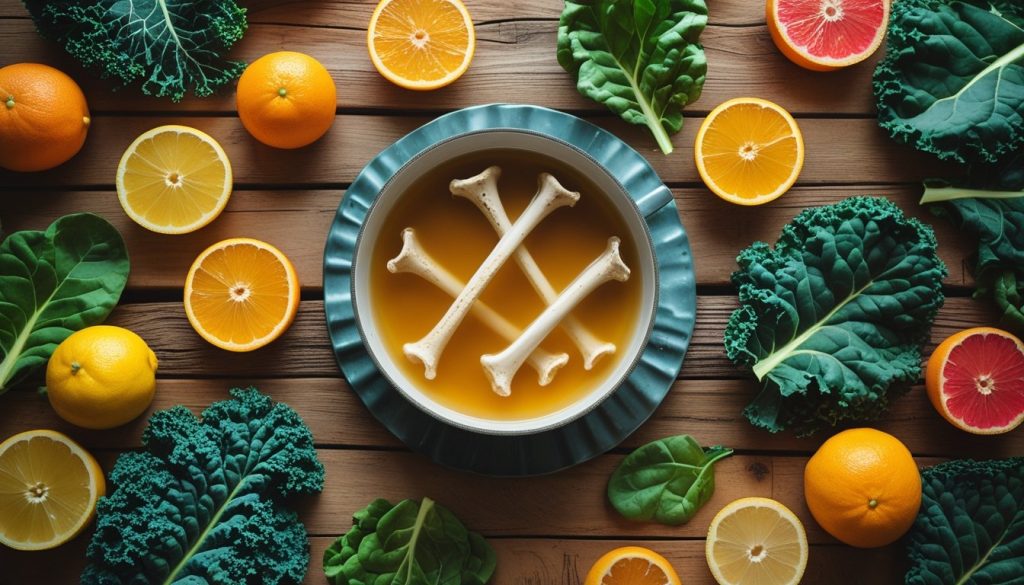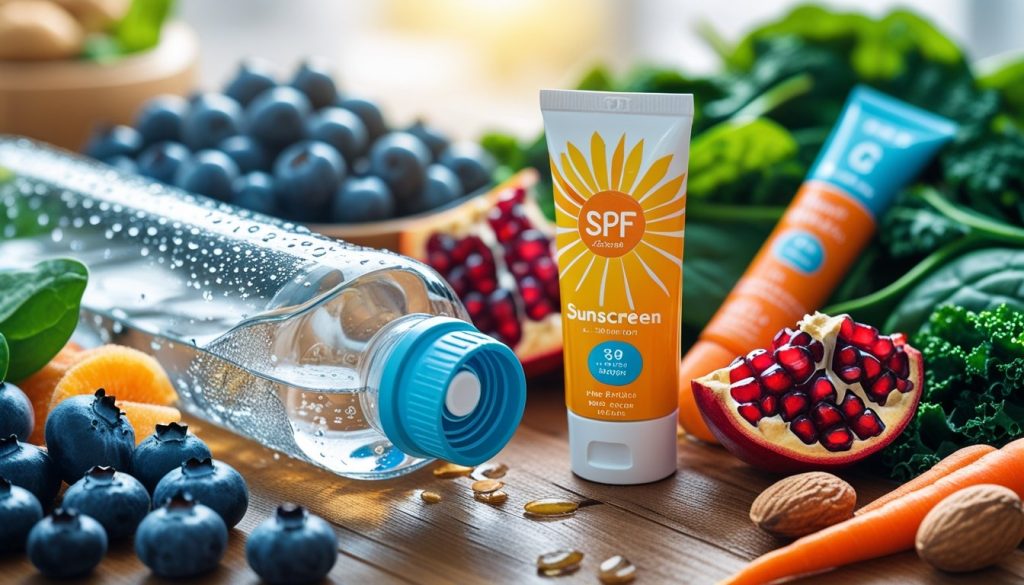Collagen production naturally declines as we age, leading to visible signs of aging, joint discomfort, and reduced skin elasticity. However, recent scientific research reveals multiple evidence-based strategies to boost your body's natural collagen synthesis without relying solely on expensive supplements.
This comprehensive guide explores seven proven methods to naturally increase collagen production, combining cutting-edge research with practical lifestyle modifications that support long-term skin health, joint function, and overall wellness.
- Understanding Collagen Synthesis: The Foundation of Natural Production
- Nutritional Strategies to Boost Collagen Production
- Lifestyle Modifications for Enhanced Collagen Production
- Advanced Natural Interventions for Collagen Enhancement
- Environmental and Lifestyle Factors Affecting Collagen Production
- Conclusion
- Frequently Asked Questions About Natural Collagen Production
Understanding Collagen Synthesis: The Foundation of Natural Production
Collagen is the most abundant protein in the human body, comprising approximately 25-30% of the total protein content and serving as the structural framework for skin, bones, tendons, ligaments, and blood vessels.
The process of collagen synthesis occurs through a complex biochemical pathway that begins within individual cells and continues in the extracellular environment4. Understanding this process provides crucial insights into how natural interventions can effectively enhance collagen production.
The collagen synthesis pathway begins with the translation of pre-procollagen, also known as collagen alpha chains, within the cellular cytoplasm. The most critical component of this initial stage involves glycine residues, which form the structural backbone of collagen molecules.
Following translation, the process proceeds to the endoplasmic reticulum, where post-translational modifications occur through the hydroxylation of proline and lysine residues via specific hydroxylase enzymes.
This crucial step requires vitamin C as an essential cofactor, underscoring the importance of adequate vitamin C intake for optimal collagen production. 10
The synthesis pathway continues with glycosylation, where sugar molecules attach to lysine hydroxy groups, followed by the formation of procollagen through the twisting of three left-handed helices into a right-handed coil 10.
Subsequently, procollagen undergoes exocytosis into the extracellular space, where peptidases cleave disulfide-rich terminals to form tropocollagen. Finally, lysyl oxidase, a copper-dependent enzyme, establishes covalent cross-links between tropocollagen molecules, creating mature collagen fibrils.

Nutritional Strategies to Boost Collagen Production
Vitamin C-Rich Foods: Essential Cofactors for Collagen Synthesis
Vitamin C plays an indispensable role in collagen production by facilitating the hydroxylation of proline and lysine residues, a process essential for the formation of stable collagen. 16 Research demonstrates that vitamin C deficiency leads to scurvy, a condition characterized by defective collagen synthesis and subsequent tissue breakdown 10.
Incorporating vitamin C-rich foods into your daily diet provides the necessary cofactors for optimal collagen production while delivering additional antioxidant benefits that protect existing collagen from degradation.
Citrus fruits, including oranges, lemons, and grapefruits, represent excellent sources of bioavailable vitamin C that support collagen synthesis 1416. A single cup of fresh orange juice provides approximately 124 milligrams of vitamin C, exceeding the daily recommended intake for most adults.
Beyond citrus fruits, red and green peppers contain even higher concentrations of vitamin C, with one cup of raw red pepper providing over 190 milligrams8. Strawberries, kiwi fruits, and tomatoes provide additional sources of vitamin C that can be easily incorporated into diverse meal plans.
Leafy green vegetables, particularly broccoli, kale, and Brussels sprouts, provide a substantial amount of vitamin C alongside other nutrients that support collagen.
One cup of cooked broccoli provides approximately a full day's dose of vitamin C, while also offering additional antioxidants that help protect against collagen degradation.
The synergistic effects of consuming vitamin C alongside other nutrients found in these foods enhance overall collagen support more effectively than isolated supplementation.
Protein Sources Rich in Collagen-Building Amino Acids
The amino acids glycine, proline, and lysine serve as fundamental building blocks for collagen synthesis, making adequate protein intake essential for maintaining optimal collagen production2.
These amino acids must be available in sufficient quantities to support the complex biochemical processes involved in collagen formation. Natural food sources provide these amino acids in bioavailable forms that the body can readily utilize for collagen synthesis.
Bone broth represents one of the most concentrated natural sources of collagen-supporting nutrients, containing bioavailable collagen peptides alongside essential amino acids28.
The slow simmering process extracts collagen from animal bones and connective tissues, creating a nutrient-dense liquid that provides direct collagen support.
Research suggests that bone broth contains calcium, magnesium, and phosphorus, in addition to collagen-building amino acids, making it a comprehensive nutritional intervention for supporting collagen.
Skin-on chicken provides substantial amounts of collagen type I, which plays a crucial role in skin, hair, and nail health3.
A 2019 study published in Alternative Therapies in Health and Medicine demonstrated that middle-aged women who consumed oral collagen supplements derived from chicken cartilage experienced significant improvements in fine lines, wrinkles, crow's feet, and skin elasticity3. This research supports the consumption of whole chicken with skin as a natural approach to collagen support.
Organ meats, including liver, heart, and kidneys, contain concentrated amounts of collagen type I alongside other essential nutrients that support overall collagen synthesis3.
While organ meats may not appeal to all dietary preferences, they are among the most nutrient-dense sources of collagen-building compounds available in natural foods.
Fish with edible bones and skin, such as sardines, provide marine-derived collagen alongside omega-3 fatty acids that support skin health and reduce inflammation3.

Lifestyle Modifications for Enhanced Collagen Production
Regular Exercise: Stimulating Collagen Synthesis Through Physical Activity
Physical exercise represents a powerful natural intervention for enhancing collagen production through multiple physiological mechanisms16.
Regular physical activity stimulates blood circulation, delivering essential oxygen and nutrients to skin cells and other tissues that produce collagen. This increased circulation supports the cellular processes involved in collagen synthesis while promoting the removal of metabolic waste products that may interfere with optimal collagen production.
Exercise also promotes cellular renewal processes that contribute to maintaining healthy collagen levels throughout the body16.
The mechanical stress applied to connective tissues during physical activity triggers adaptive responses, including increased collagen synthesis. Weight-bearing exercises, in particular, stimulate collagen production in bones and joints, supporting overall skeletal health and joint function.
Resistance training exercises that involve controlled muscle contractions create beneficial stress on connective tissues, promoting the synthesis of collagen in tendons and ligaments.
Cardiovascular exercises improve overall circulation, ensuring that collagen-producing cells receive adequate nutrient delivery for optimal function. The combination of different exercise modalities provides comprehensive support for collagen production throughout various body systems.
Antioxidant Protection: Preserving Existing Collagen
Antioxidants play a crucial role in maintaining collagen by protecting existing collagen fibers from degradation caused by free radical damage.
Environmental factors such as ultraviolet radiation, pollution, and oxidative stress can accelerate collagen breakdown, making antioxidant protection essential for maintaining optimal collagen levels.
Natural antioxidant sources provide comprehensive protection while supporting the overall health of collagen-producing cells.
Berries, including blueberries, blackberries, and strawberries, contain high concentrations of anthocyanins and other antioxidants that protect collagen from oxidative damage14.
These compounds neutralize free radicals that would otherwise contribute to collagen degradation, helping preserve existing collagen while supporting new collagen synthesis.
The vitamin C content in berries provides additional support for collagen synthesis, creating a synergistic effect that enhances overall collagen health.
Nuts and seeds, particularly almonds, sunflower seeds, and chia seeds, provide vitamin E and zinc, alongside healthy fats that support skin elasticity and collagen production.
14 Zinc serves as an essential mineral for collagen synthesis, while vitamin E provides antioxidant protection for collagen fibers.
The healthy fats found in nuts and seeds support overall skin health and may enhance the bioavailability of fat-soluble vitamins that contribute to collagen support.
Sleep Optimization: Supporting Collagen Repair and Regeneration
Quality sleep provides essential time for collagen repair and regeneration processes that occur during overnight recovery periods. During deep sleep stages, the body increases growth hormone production, which stimulates collagen synthesis and cellular repair mechanisms.
Inadequate sleep duration or poor sleep quality can interfere with these natural regeneration processes, potentially limiting optimal collagen production.
Sleep optimization strategies include maintaining a consistent sleep schedule, creating an optimal sleep environment, and addressing factors that may interfere with sleep quality.
The typical recommendation of 7-9 hours of sleep per night provides adequate time for the complex biological processes involved in collagen synthesis and repair.
Establishing regular sleep patterns supports the body's natural circadian rhythms, which regulate various aspects of cellular function, including collagen production.
Environmental factors such as room temperature, lighting, and noise levels can significantly impact sleep quality and, consequently, collagen regeneration processes.
Creating a calm, dark, and quiet sleep environment promotes deeper, more restorative sleep, which supports optimal collagen synthesis.
Additionally, avoiding stimulants such as caffeine and electronic devices before bedtime can improve sleep quality and enhance overnight collagen repair processes.

Advanced Natural Interventions for Collagen Enhancement
Mesenchymal Stem Cell Support Through Natural Methods
Recent research has highlighted the role of mesenchymal stem cells (MSCs) in skin regeneration and collagen production1. MSCs are multipotent stem cells that can be obtained from various sources, including bone marrow, adipose tissue, and umbilical cord blood.
These cells exhibit significant healing capacities that can be harnessed to treat damaged and aged skin through their ability to enhance cell proliferation, promote neovascularization, and mitigate inflammation in skin injury lesions1.
In skin rejuvenation applications, MSCs contribute to the production of collagen and elastic fibers while inhibiting metalloproteinase activation and providing protection from ultraviolet radiation-induced senescence.
While direct MSC therapy requires medical intervention, natural approaches to support endogenous stem cell function may enhance the body's natural collagen production capabilities.
These approaches include maintaining optimal nutrition, engaging in regular exercise, getting adequate sleep, and practicing stress management techniques that support overall cellular health.
Certain natural compounds have been shown to support stem cell function and potentially enhance their collagen-producing capabilities. Aloe vera consumption, for example, has been shown to increase collagen content in the dermis layer of skin3.
A 2020 study published in The Journal of Dermatology found that daily oral intake of 40 micrograms of aloe helped increase skin barrier function, moisture, and elasticity, suggesting potential benefits for supporting natural collagen.
Signal Peptide Enhancement Through Natural Sources
Signal peptides represent naturally occurring compounds that trigger signaling cascades and stimulate collagen production in fibroblasts. 13
These molecules, naturally found in human skin, serve specific biological functions and act as signaling molecules in various physiological processes, including homeostasis, growth, defense, and immunity.
Understanding how to support natural signal peptide function provides additional opportunities for enhancing collagen production through non-invasive approaches.
Natural sources of signal peptides and peptide precursors can be found in various protein-rich foods, particularly those derived from marine sources. Fish collagen, concentrated in bones, skin, and scales, provides peptides that may support collagen synthesis when consumed regularly3.
The bioavailability of these natural peptides allows for direct utilization by the body's collagen synthesis pathways.
Fermented foods and specific plant proteins may also provide peptide compounds that support collagen synthesis. The fermentation process can break down larger proteins into smaller, more bioavailable peptides that may enhance the body's natural collagen production capabilities.
Incorporating diverse protein sources, including both animal and plant-based options, provides a broad spectrum of amino acids and peptides that support comprehensive collagen synthesis.
Environmental and Lifestyle Factors Affecting Collagen Production
Reducing Collagen-Damaging Behaviors
Several lifestyle factors can significantly impair collagen production and accelerate collagen degradation, making their modification essential for maintaining optimal collagen health. 16
Alcohol consumption disrupts cellular processes and causes damage to skin cells, while excessive alcohol intake leads to body dehydration that affects skin elasticity and promotes premature wrinkle formation16.
Limiting alcohol consumption supports natural collagen production while reducing factors that contribute to collagen breakdown.
Tobacco use represents one of the most significant threats to collagen health, causing damage to skin cells by disrupting collagen production and promoting the appearance of wrinkles and dark spots16.
The chemicals in tobacco smoke generate free radicals that directly attack collagen fibers while simultaneously impairing the body's ability to synthesize new collagen.
Smoking cessation provides immediate benefits for collagen health, allowing natural repair processes to resume optimal function.
Chronic stress contributes to collagen degradation through increased cortisol production, which can interfere with collagen synthesis and promote inflammatory processes that damage existing collagen.
Stress management techniques such as meditation, yoga, deep breathing exercises, and regular relaxation practices support optimal collagen production by reducing cortisol levels and promoting overall cellular health.
The implementation of comprehensive stress management strategies offers long-term benefits for maintaining collagen and promoting overall skin health.
Sun Protection and Environmental Considerations
Ultraviolet radiation represents a primary environmental threat to collagen integrity, causing both immediate damage and long-term degradation of collagen fibers1.
UV exposure triggers the production of matrix metalloproteinases (MMPs), enzymes that break down collagen and other components of the extracellular matrix.
Consistent sun protection practices, including the use of broad-spectrum sunscreens, protective clothing, and avoiding peak UV exposure times, preserve existing collagen while allowing natural synthesis processes to continue unimpeded.
Environmental pollution exposure can also contribute to collagen degradation through the generation of free radicals and inflammatory responses1. While complete avoidance of ecological pollutants may not be practical, specific protective measures can minimize their impact on collagen health.
These include regular skin cleansing to remove pollutant residues, increased antioxidant intake to neutralize free radicals, and the use of air purification systems in indoor environments when possible.
Climate factors, such as low humidity and extreme temperatures, can impact skin barrier function and collagen health. Maintaining adequate hydration through both internal water intake and external moisturization supports optimal skin function and collagen synthesis.
The use of humidifiers in dry environments, combined with the application of appropriate skin care products, can help maintain optimal conditions for collagen production and preservation.

Conclusion
Enhancing natural collagen production requires a comprehensive approach that addresses nutrition, lifestyle factors, and environmental considerations.
The scientific evidence demonstrates that multiple natural interventions can effectively support the body's inherent ability to synthesize collagen, providing sustainable alternatives to expensive supplements and invasive procedures.
By implementing vitamin C-rich nutrition, consuming collagen-building amino acids, maintaining regular exercise routines, optimizing sleep quality, and protecting against environmental damage, individuals can significantly enhance their natural collagen production capabilities.
The key to successful natural collagen enhancement lies in consistency and the integration of multiple supportive strategies rather than relying on any single intervention.
The synergistic effects of proper nutrition, regular physical activity, adequate rest, and environmental protection create optimal conditions for sustained collagen synthesis throughout the aging process.
These evidence-based approaches not only support collagen production but also contribute to overall health and wellness, providing comprehensive benefits that extend beyond cosmetic improvements to include joint health, wound healing, and general tissue integrity.
For those seeking to optimize their natural collagen production, implementing these science-backed strategies provides a foundation for long-term success.
The gradual, sustainable improvements achieved through natural methods often prove more durable and beneficial than short-term interventions, supporting not only immediate collagen enhancement but also the maintenance of optimal collagen production capabilities throughout the aging process.
Ready to dive deeper into the building blocks of collagen? Discover the essential amino acids that power your body's natural collagen synthesis and learn how to optimize your intake for maximum benefits. Explore our comprehensive guide to amino acids and their role in collagen production for expert insights on maximizing your natural collagen potential.
Frequently Asked Questions About Natural Collagen Production
Q: How long does it take to see results from natural collagen boosting methods?
A: Natural collagen production improvements typically become noticeable within 4-8 weeks of consistent implementation. However, significant changes in skin elasticity and joint comfort may take 3-6 months of sustained effort, as collagen turnover occurs gradually throughout the body.
Q: Can vegetarians and vegans increase collagen production naturally?
A: Yes, plant-based diets can effectively support collagen production by incorporating vitamin C-rich foods, plant proteins that contain essential amino acids, and antioxidant-rich fruits and vegetables. While direct collagen consumption requires animal sources, the building blocks for collagen synthesis are readily available in plant foods.
Q: What foods should I avoid to maintain healthy collagen levels?
A: Limit processed foods high in added sugars, which can cause glycation and collagen damage. Reduce excessive alcohol consumption, avoid tobacco products, and minimize foods high in advanced glycation end products (AGEs) such as heavily processed or charred meats.
Q: Does drinking more water help with collagen production?
A: Adequate hydration supports overall cellular function and nutrient transport, which indirectly benefits collagen synthesis. While water alone doesn't directly increase collagen production, proper hydration maintains optimal conditions for the cellular processes involved in collagen synthesis.
Q: Are there specific exercises that boost collagen production more than others?
A: Weight-bearing exercises and resistance training provide the most direct benefits for collagen production by creating beneficial stress on connective tissues. Combining cardiovascular exercise with strength training offers comprehensive support for collagen synthesis throughout various body systems.
Q: Can stress really affect my collagen levels?
A: Yes, chronic stress elevates cortisol levels, which can interfere with collagen synthesis and promote inflammatory processes that damage existing collagen. Implementing stress management techniques significantly supports optimal collagen production and maintenance.
Q: Is it better to get collagen-supporting nutrients from food or supplements?
A: Whole foods generally provide better bioavailability and additional nutrients that support collagen synthesis. Foods offer synergistic effects from multiple nutrients working together, while supplements may lack the comprehensive nutritional profile found in natural sources.
Q: What role does sleep play in natural collagen production?
A: Sleep is crucial for collagen production as growth hormone release peaks during deep sleep stages, stimulating collagen synthesis and cellular repair. Consistent, quality sleep of 7-9 hours nightly provides optimal conditions for natural collagen regeneration.
Q: Can sun exposure completely stop collagen production?
A: While moderate sun exposure doesn't halt collagen production entirely, excessive UV radiation significantly accelerates collagen breakdown and impairs synthesis. Consistent sun protection preserves existing collagen while maintaining optimal conditions for new collagen formation.
Q: How does aging affect the success of natural collagen boosting methods?
A: Natural collagen production naturally declines with age, but implementing supportive strategies remains effective at any age. While results may develop more gradually in older individuals, consistent application of natural methods can significantly slow collagen loss and support continued synthesis.

